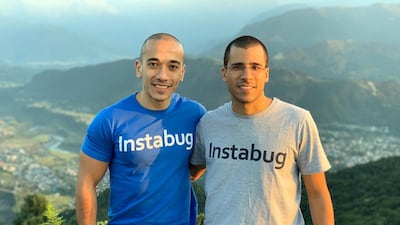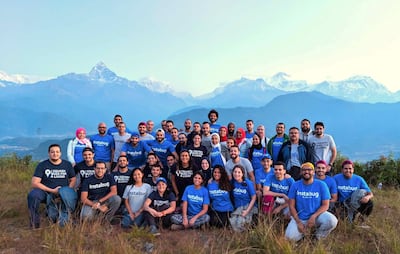Omar Gabr and Moataz Soliman first stumbled on the idea for their start-up while trying to develop an app during their last term at Cairo University. In 2013, the two computer engineering graduates were building a website connecting app developers to those interested in testing the software before launch.
“Part of this project was a simple way to submit feedback. If you are a user that is using an app on our platform and you’ve bumped into an issue, just shake the phone and [our application] pops up and you report this bug,” says Mr Gabr.
Mr Gabr and Mr Soliman soon noticed something. Although the app itself failed to gain much traction, the bug reporting mechanism did. App developers appreciated the relatively quick way they could identify problems in their products and solve them.
That led to the birth of Instabug – short for instant bug reporting – a software as a service start-up that provides insights to app developers, allowing them to debug applications quickly.
“We provide companies with real-time insights. Through our dashboard they can understand what problems users are bumping into, when the app is crashing, what users like and dislike … basically, we give them a holistic view on app performance,” Mr Gabr says.
Real-time insights mean identifying a bug immediately - a lifeline for app developers that count on user reviews to ratchet up their ratings on app stores, Mr Gabr says. Throughout this process, Instabug has hardly any interaction with mobile app users, who are blissfully unaware of the company’s presence. But for developers, a bug-free user experience could mean millions in revenue if their apps are highly rated.
“People are less tolerant to bugged apps. Mobile teams cannot be reactive to such bugs,” he says.
Today, Instabug runs on 2.5 billion devices globally and across 25,000 mobile apps. It has seen 7.5 billion bugs reported through its platform. The company’s customers include Samsung, Lyft, Philips and Hilton, among others, that pay a premium for seamless user experience. While Instabug started with basic bug reporting, the founders later added features such as crash reporting, in–app feedback, and in-app chat to expand their base.
Instabug has also benefited from a booming global app industry that has mushroomed due to higher smartphone penetration. According to mobile app market intelligence provider Sensor Tower, app revenues from Apple’s App Store and the Google Play store combined grew 17 per cent to hit $83.5 billion (Dh306.6bn) last year.
This is set to grow further in 2020 as wide-ranging stay-at-home directives to stem the spread of Covid-19 increase
app usage – particularly within the gaming and entertainment sectors.
Although Mr Gabr did not disclose the company’s revenue or the start-up’s valuation, he says business is booming. “Usage of Instabug has grown 45 per cent since January. Our clients offering on-demand and entertainment are seeing a surge as people are using them more.”
Last year, the Cairo-based start-up’s revenue grew 120 per cent, according to Mr Gabr, who says the company is profitable.
But the journey was not without challenges for the entrepreneurs - not least in reaching app developers worldwide.
“We were solving a global problem and we wanted to sell to companies based in San Francisco, Berlin, Moscow, New York, while we were sitting in Cairo. The challenge was how we could reach these customers without physically being in these markets,” says Mr Gabr.
While their main office is still based in Egypt, Mr Gabr – who handles sales and marketing – splits his time between Egypt and San Francisco. His co-founder and colleague, Mr Soliman, heads the engineering division.
With Instabug now on a sure footing, the entrepreneurs have big plans to scale and expand the company’s research and development.
“We are going to launch more features for app developers to monitor the performance of their apps and improve user experience,” says Mr Gabr.
Instabug started with $10,000 in funding from accelerator Flat6Labs Cairo, but was subsequently accepted into prestigious US accelerator Y Combinator in 2016 – becoming the second Egyptian start-up in a progamme that has mentored companies like Airbnb and DoorDash. Upon completion, Instabug bagged $1.7 million from Y Combinator and Accel Partners, which previously invested in start-ups like UI Path and MoPub.
Earlier this month, Instabug raised $5m in Series A funding from Accel Partners, with Cloudera co-founder Amr Awadallah and MoPub's former chief executive Jim Payne pitching in.
With adequate funding, Mr Gabr says the company will now focus on perfecting their product. The founders have no plans to actively fundraise in the coming months.
“We are [planning to] build more features, acquire more customers and double down on our business.”
Q&A with Omar Gabr of Instabug
Which other successful start-up do you wish you had started?
I am very fortunate to have what we built. If I have to go back I would probably choose Instabug all over again.
What would you like to change if you have to do things again?
On a micro level there were things that could have been done better but on a macro level, I wouldn’t change anything. I am fortunate to have an amazing co-founder who complements my skills and is a great support. I am fortunate to build a product from Egypt that is being used by top companies in the world. We are really happy with the investors we have. There isn’t anything massive we would want to change.
What is the next big thing you’re focusing on?
Our focus is on turning Instabug into a success story for the region. We have not seen many exits happening in the Mena region. We are building a global company that stays in Egypt and is founded and built by Egyptians. That’s the biggest impact we [are aiming to] have.
What skills have you learnt in the process of launching a start-up?
It has been a life-changing event. I haven’t worked in any company before and the same goes for my co-founder. I learned everything through Instabug.
Reed Hoffman, the founder of Linkedin, once said: “Founding a start-up is as if you were jumping off a cliff”. It is like trying to assemble an aeroplane while in the air and trying to get it to work for you before you hit the ground. Most things I learnt, whether it is about product design or managing people, sales, marketing – I learnt through this. We made mistakes, way more than we got right. But these mistakes made me learn a lot of things.



